Rooted In Revenue
Host: Lany Sullivan
Episodes
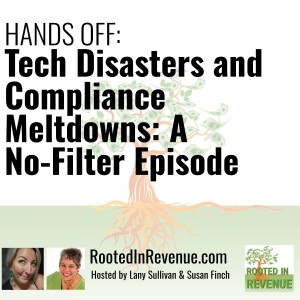
Wednesday Sep 18, 2024
Tech Disasters and Compliance Meltdowns: A No-Filter Episode
Wednesday Sep 18, 2024
Wednesday Sep 18, 2024
Susan and Lany are fired up in this episode, tackling the infuriating world of tech blunders, compliance nightmares, and security fails that plague businesses. From email marketing mishaps to clickbait disasters, they're not holding back on the ways people unknowingly sabotage their operations. This is part one of their conversation, so prepare for some straight talk filled with cautionary tales and a healthy dose of 'what were they thinking?' Stay tuned for part two, where they'll continue their mission to save you from yourself in the tricky terrain of business tech. Remember, sometimes doing nothing is the best move – especially when it comes to messing with stuff you don't understand!
Action items (or inaction items):
Stop using personal Gmail accounts for business; set up Google Workspace instead.
Don't buy domains from cheap or suspicious sources.
Ensure your email marketing is compliant with new laws (as of February 2024).
Use secure file transfer methods for sensitive client information.
Be cautious of scams and verify legitimacy before giving out information or access.
Freeze your credit reports to protect your information.
Don't touch or change technical settings if you're not sure what you're doing.
Implement proper security measures and compliance procedures in your business.
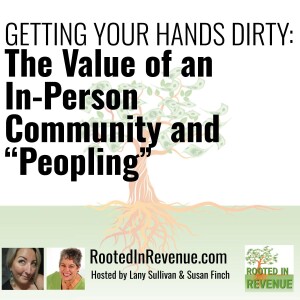
Wednesday Jun 19, 2024
Getting Your Hands Dirty: The Value of an In-Person Community and "Peopling"
Wednesday Jun 19, 2024
Wednesday Jun 19, 2024
Are you a service business looking to grow your presence in your local community? In this episode of Rooted in Revenue, hosts Lany Sullivan and Susan Finch explore the power of in-person community building for both personal and business growth.
Lany shares her experience with the Art in the Garden event, showcasing how community involvement can open doors to unexpected opportunities and relationships. The duo emphasizes the importance of showing up consistently, being vulnerable, and participating in events and groups aligned with your interests.
This episode will inspire you to focus on "peopling" - connecting with others in your community face-to-face. Lany and Susan offer practical advice on joining local organizations like the Chamber of Commerce and Rotary Club, and the benefits of serving on nonprofit boards.
Discover how building a strong foundation of community relationships can support your personal and professional growth. Learn why showing up authentically and helping others can lead to a thriving, connected business community.
Key points from this episode:
Lany emphasized the importance of showing up in person, building community, and participating as a human with other humans rather than just communicating online.
Lany got involved in a community event called Art in the Garden to promote her property for weddings and events. She connected with many people in her community through this event.
Lany and Susan discussed how participating in community activities and helping others allows unexpected conversations and connections. It breaks down walls between people.
Lany built her community roots by joining the Chamber of Commerce and Rotary Club and serving on seven nonprofit boards when she first moved to Grants Pass. This laid the foundation for strong community relationships.
Susan encouraged people to find groups and activities aligned with their interests, whether hiking, antiquing, gardening, etc. Showing up consistently builds community.
Lany advised that when getting involved in community groups, be yourself, show up, and be willing to be vulnerable. Most groups are welcoming to new people.
Susan challenged listeners to be present, do some "peopling," and focus on in-person connecting rather than just online networking.
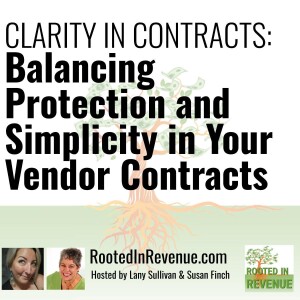
Wednesday May 22, 2024
Balancing Protection and Simplicity in Your Vendor Contracts
Wednesday May 22, 2024
Wednesday May 22, 2024
Are you a small business owner unsure about contracts, roles, and expectations with your clients? In this episode of Rooted in Revenue, we dive into the importance of having clear agreements to protect you and your clients. As vendors, we understand the challenges of navigating these relationships and the potential pitfalls of not having a solid foundation. We discuss what clients should expect from you, how to demonstrate your value, and the key elements to include in your contracts. Whether you're a solopreneur or running a small agency, having well-defined contracts and expectations is crucial for a successful business partnership. Join us as we share our experiences and insights on this essential topic and learn how to set yourself and your clients up for a mutually beneficial working relationship.
Here are five key takeaways from this episode:
Find out what a vendor's offboarding process is when you're done working with them, including how long they keep your information and how you will receive your deliverables. (Lany Sullivan)
Delete access credentials and accessibility immediately when a client or vendor relationship ends to protect both parties. (Susan Finch and Lany Sullivan)
Vendor contracts don't need to be lengthy; they should be simple, cover worst-case and best-case scenarios, and be easy for clients to understand. (Susan Finch)
As a vendor, ensure your services and contracts are comprehensive and accessible to make clients feel good about working with you. (Lany Sullivan)
Payment processors like Stripe and PayPal tend to side with clients in disputes, so having clear contracts, signatures, and proof of service is crucial for protecting your business. (Lany Sullivan)
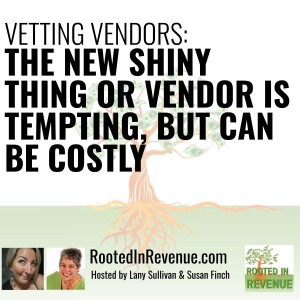
Wednesday May 15, 2024
Vetting Vendors: The New Shiny Thing Or Vendor is Tempting, But Can Be Costly
Wednesday May 15, 2024
Wednesday May 15, 2024
Are you entrusting your business to the right vendors? In this episode of Rooted in Revenue, Susan Finch and Lany Sullivan dive deep into the crucial topic of vetting vendors. From graphic designers to accountants, they share eye-opening insights on what to look for and what to avoid. Discover the importance of securing your intellectual property, protecting your sensitive information, and ensuring your vendors have your back in any situation. Susan and Lany also reveal the shocking truth about the security risks posed by many accounting firms. Don't miss their expert advice on how to find reliable vendors who align with your values and prioritize your business's success. Tune in to learn how to safeguard your company and make informed decisions when choosing the people and tools you rely on. Your business deserves the best - start vetting your vendors like a pro today!
Need help vetting a potential vendor - contact Susan
Top Tips from this episode:
Don't respond to cold call emails or messages from vendors you don't know. Instead, ask for referrals from trusted peers and networks. (Susan)
When considering a vendor, research how long they've been in business, read reviews (especially on Reddit and Quora), and ask for testimonials from their clients. (Lany)
Request all file formats and a complete brand package from your graphic designer, including vector files, fonts, and color codes. (Susan)
Ensure that you have the rights to use the fonts in your logo and that you own all the designs created for your business. (Susan)
Have a contract in place stating that any work created by contractors for your business is your intellectual property. (Lany)
Ask your accountant or CPA about their security measures, including secure portals, communication methods, and record retention policies. (Lany)
Choose vendors who have a backup plan and can recommend trusted professionals to take over their tasks if something happens to them. (Susan)
Align yourself with vendors who have strong relationships with strategic partners and genuinely care about your business's success. (Susan)
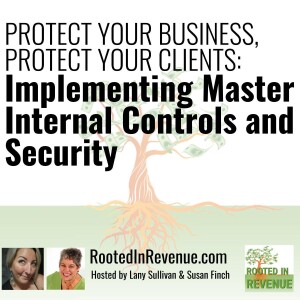
Tuesday Apr 23, 2024
Tuesday Apr 23, 2024
Are your business's internal controls and security measures up to par? In this final episode of our 6-part series, Lany Sullivan and Susan Finch dive deep into the importance of protecting your clients' information and your own liability. They expose common pitfalls like using sticky notes for passwords or entrusting cash transactions to a single person. Lany and Susan emphasize the critical need for secure password management, digital money trails, and multi-person verification processes. They urge listeners to examine their business infrastructure for potential risks and take responsibility for addressing them. While the process may seem daunting, our hosts reassure you that it's well worth the effort in the long run. Whether you need Lany's expertise in setting up foolproof procedures or Susan's guidance in optimizing what you already have, this episode will leave you motivated to tackle those security challenges head-on.
Catch the full series here:
Prioritize for Profitability: Establishing Foundational Systems for Business Growth
Mastering Growth: 4 Signs You Need a Business Asssessment
Love, Hate, Delegate: Transforming Your Business Through Delegation
Visionaries & Integrators: Navigating the Generalist vs. Specialist Hiring Maze
Building a Sustainable Tech Stack - Do you still use it?
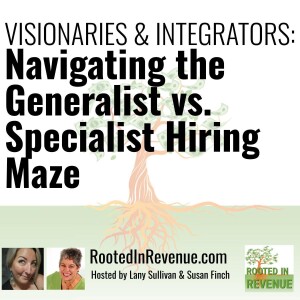
Tuesday Apr 09, 2024
Visionaries & Integrators: Navigating the Generalist vs. Specialist Hiring Maze
Tuesday Apr 09, 2024
Tuesday Apr 09, 2024
Susan Finch and Lany Sullivan dive into the crucial decision of hiring generalists or specialists for your business in this insightful episode of Rooted in Revenue. They discuss the roles of virtual assistants (VAs), online business managers (OBMs), and the importance of finding the right fit for your team. Lany emphasizes the significance of hiring based on your specific needs and goals, rather than defaulting to a VA. The duo also touches on the value of fostering a supportive and empowering work environment where team members feel comfortable questioning decisions and suggesting improvements. Tune in for valuable tips on building a team that aligns with your vision and propels your business forward.
Free Chaos to Process Guide from Lany
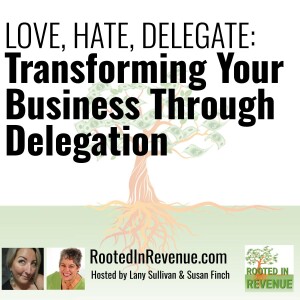
Monday Apr 01, 2024
Love, Hate, Delegate: Transforming Your Business Through Delegation
Monday Apr 01, 2024
Monday Apr 01, 2024
Are you drowning in tasks and struggling to let go of control in your business? In this third episode of the Rooted in Revenue series, Lany Sullivan and Susan Finch dive into the power of delegation and how it can lead to more time and freedom. They discuss the importance of identifying tasks you love and hate, and provide practical strategies for delegating at all levels of your organization. From overcoming the fear and vulnerability of delegating to developing trust with your team, Lany and Susan share insights on how to break free from the self-induced chaos of trying to do it all yourself. They also emphasize the importance of effective communication and empowering your team members in the delegation process. Tune in to learn how implementing "Love, Hate, Delegate" can transform your business and unlock your path to greater freedom and success.
Love, Hate, Delegate Workbook from Lany
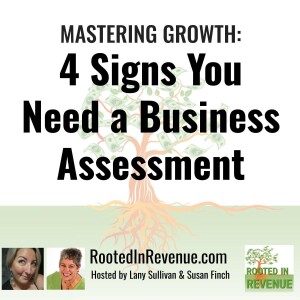
Tuesday Mar 26, 2024
Mastering Growth: 4 Signs You Need a Business Asssessment
Tuesday Mar 26, 2024
Tuesday Mar 26, 2024
Susan Finch and Lany Sullivan are plunging into the inky black to tackle the four crucial moments when conducting a business assessment, which is an absolute must. They'll help you identify the signs that your business is ready for a thorough evaluation, and trust us, ignoring these red flags could lead to a total "blowup" down the line – and nobody wants that!
Lany shares her expert insights on navigating the challenges of rapid growth, delegating effectively, optimizing your tech stack, and building an ideal team with high efficiency and retention. Whether you're a visionary leader or a detail-oriented executive, this episode is oozing with actionable advice to help you achieve sustainable success. Are you ready to assess, optimize, and take your business to new possibilities of scale and growth?
Some key points you may want to jump to:
00:00:00 Introduction: The importance of conducting a business assessment00:00:30 Four key areas that indicate when to do a business assessment00:01:00 Point 1: Navigating explosive growth and maintaining infrastructure00:04:30 Point 2: CEO holding all knowledge and not delegating effectively00:12:30 Point 3: Outdated systems and broken tech stack00:24:00 Point 4: Preparing to hire new team members00:25:00 Conducting Lany's system of "Love, Hate, Delegate" exercise to identify hiring needs00:27:00 Documenting processes and creating a detailed scope of work00:28:30 Developing an onboarding process and setting expectations for new hires00:30:00 The importance of taking the time to document and train properly
If you want to see this episode, it's on the Funnel Media Group channel here: https://youtu.be/V_UWOh43inM
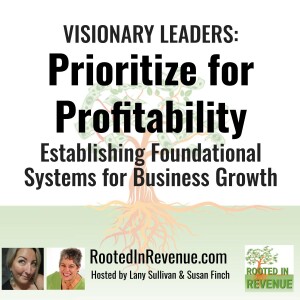
Tuesday Mar 19, 2024
Tuesday Mar 19, 2024
Are you leaving money on the table in your business? If you haven't evaluated your entire customer journey from end to end, chances are there are holes that are costing you revenue. In this episode, operations experts Susan Finch and Lany Sullivan dive into why your customer journey is the key to sustainable revenue. They share examples of the broken processes they often see, and provide practical advice for establishing foundational systems that will help you shift from constantly rebuilding your business to making small pivots for long-term growth. Tune in to discover how to plug the leaks in your customer journey and build a business that works.
Some key points from this episode include:
Lany (5:40): "Your money is between your marketing and your referrals. It's between those two things from beginning to end and everything in between. It's the entire customer journey process."
Susan (9:40): "It doesn't do any good to just throw money at a solution, get the solution, and then not implement the work. You do have to do the work or hire somebody to do the work."
Lany (14:35): "Visionaries are all over the board... You got to rein it in and you got to really, that comes back to you got to prioritize, and it goes back to your vision, your values, your mission, your goals."
Susan (18:25): "Ideally, people are saying nice things about us when we are asleep, and we wake up, and there'll be leads in our inbox, the phone will be ringing with people. I heard. I know. You're great. Fantastic. And if you're not getting that, you are missing; obviously, you are just churning your customer base. Churn is expensive."
Lany (20:20): "My whole shtick is sustainable processes, right? Long-term sustainability. So you don't have to go rebuild and overhaul your business every two to five years. Mine is all you have to do is make micro changes and just keep shifting and pivoting as you go because your business will shift and pivot."
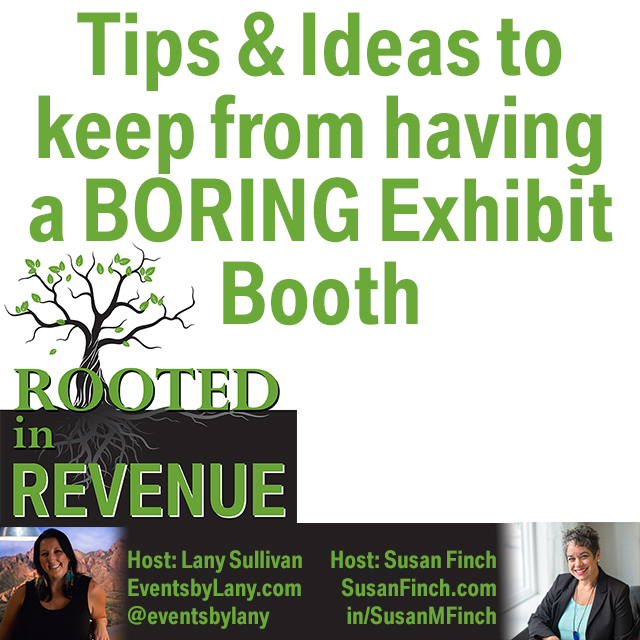
Tuesday Jun 19, 2018
Is Your Exhibit Booth Boring - answer - YES IT IS.
Tuesday Jun 19, 2018
Tuesday Jun 19, 2018
Let's talk about what used to work, sort of: 6 foot table, skirt - branded or not, logo behind, business cards, two chairs, fishbowl for cards, bad candy to give away. (YAWN!) A total waste of resources. You must be memorable. You must be a destination booth at the event. If you don't have a booth, you need to do SOMETHING to stand out.
Listen to this episode for ideas for ideal give aways, engaging activities, treats, swag and more.
After the break we'll also tell you what to avoid doing, hint: Buzzers, bells, anchor drops, puppies. The ideas range in budget - something for everyone.
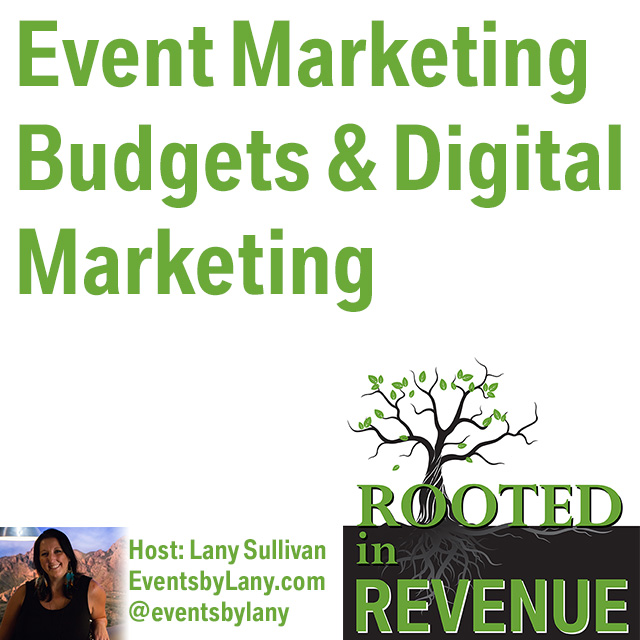
Monday May 21, 2018
Event Marketing Budgets & Digital Marketing
Monday May 21, 2018
Monday May 21, 2018
Every year businesses determine what their marketing, sales, sponsorship, advertising, social,etc, etc line items will be in the budget.
If you are an entrepreneur and not doing this I would highly recommend you find a money manager and start doing this.
What many businesses forget to think about (or it's an afterthought) is events.
Events are magic.
Alright, maybe that's not the best selling point for me to give to justify adding events into your annual budget. Let's look at every major consumer brand in the US. Every single one of them does events. They spend hundreds of thousands and millions of dollars to get eyeballs on their brand and samples of products in consumer hands.
The #1 reason to do events is visibility and brand awareness.
These brands look for an ROI, but do you know that it's not always a cash/revenue ROI that they want to see?
They want to see impressions. How many people saw our product and within that there are calculations to figure out the reach of what one individual consumer is actually worth in impressions. It's a complicated math game.
So, if these brands think it's important why don't you?
You don't have to spend hundreds of thousands or millions of dollars. Let's start small.
You are an entrepreneur and have a service that you offer (coaching, tech, social media, etc). You can invite 5-20 people to an event and charge then $0-300.
This event can be held in your living room, an art gallery, a golf club or resort, a gorgeous meeting space in a local hotel. Heck, even the library. These spaces will cost you anywhere from $0-$1500.
Your invite your guests to come to a local half day or one day event to learn from you on a specific area of your service.
You show up and deliver an abundance of value and they walk away feeling like they just won the lottery. What really happened here?
You just made an impression. Hundreds of them.
If you delivered tons of value...
They are going to see you in a different light. They will see you as the expert.
They will tell their friends and business associates about you.
They will share your info on social media.
They may hire you for your expertise.
An event like this doesn't require
A lot of planning
An event planner
A large budget
Let's simplify this even more.
Invite 5 of your closest business associates to a 2 hour session for free or for a very low price to give you feedback on a presentation that you have been working on. Ask for feedback and referrals. Let them know up front that you'll be asking for feedback and referrals, so that they come prepared.
Do this. Experiment. Get out of your comfort zone.
The do it again with a larger crowd. Invite your 5 friends back and ask them to bring one person with them the next time.
Each time you do this you begin to get more comfortable and confident in your content and the service that you offer. Talking about what you do will feel less and less salesy.
Create monthly or bi-monthly events. All low cost. All local. Create a routine and become familiar to your local community. Once the word gets out that your are offering high value information in your events you will attract your target audience and before you know it, you will need to create a bigger event at a larger venue.
If you start out small like this you can create a line item for events of $10,000 or less and create something impactful in your first year.
If you want to create larger events, I recommend that you start planning and budgeting 12-18 months out. If you know your event is going to cost $30,000 then every month you start tucking away and saving money that is specifically earmarked for your event.
This process makes it easier to pay deposits when they are due. Rather than stressing about how to come up with the money, you know you already have it in your event budget and can comfortably right that check or put down that credit card for the deposits.
What I see happen all the time is business owners decide they want to create an event, then they realize the cost and they either scramble to find the money causing way more stress than needed or they toss their dreams aside and forget it OR they try to create a Ritz Carlton event on a Motel 6 budge….. ON THEIR OWN….and fail miserably, swearing off events for the unforeseeable future BECAUSE events don't work!
Events work, but just like everything else in your business you need to have a budget and a strategy.
If you run a marketing agency, especially a digital marketing agency and don’t have an event arm in your business strategy you are doing your clients a disservice.
Hold up, don’t be mad. I’m trying to help you out here. There is so much focus on the digital side and you are working SO diligently for your clients. It’s an uphill climb to get visibility, to get their product or service out, to get engaging customers. I know your struggle. We live in a very loud world where everyone is trying to get everyone else’s attention.
How do you stand out in the chaos?
This well known but underutilized tool called events.
If you showed up with an event strategy for your clients that pulled their customers into a face to face, hands on experience you’ve just changed the game. You’ve now opened up another marketing channel that probably was not in use… WOMM. Word of Mouth Marketing. WOMM is a powerful marketing tool. It is not dead. It is alive and well. Look at every movie you’ve watched and who have you told about it? What about that bad customer service or the great sales on shoes? You’ve called your friends, told your co-workers, cousins, bosses, nanny, neighbor, everyone and shared an experience that you had with a brand, company, movie, etc.
This is why events are so dynamic and this is why it’s your responsibility to show your clients that value of creating live events.
If we go back to my post about having an event budget, you will see that I talk about what the major consumer brands are doing. They are actively every year putting their products in the hands of their consumers.
I hear you saying, well I don’t have a product that I can give away. I disagree. You can pull anyone in to play and test your product in your offices. Create a fun tech day and invite potential customers to come in, eat some food, learn about your services and get their hands on your product live and in person. SIMPLE.
You don’t have to pass out millions of samples, you can invite 5 to 10 local businesses in for a day or a couple of hours.
CREATE SOMETHING.
Be innovative. Your clients will appreciate that. They want that. They need that. They are hiring you to help them stand out from the noise. If you are just doing to some old offerings and programs you give to EVERY.OTHER.CLIENT. then you, my friend, are missing an amazing opportunity.
Expand your services, hire an event consultant (ahem...I’m available) and create some interesting and innovative ideas for your clients. Now YOU are standing out from the noise and are helping them do the same.
Let me say, that I see the lack of event ideas in the small, entrepreneurial marketing agency space. The big digital agencies have this down to a science. I recommend taking a page from their book and increase the offerings and calibur of your business. Watch it change your world.
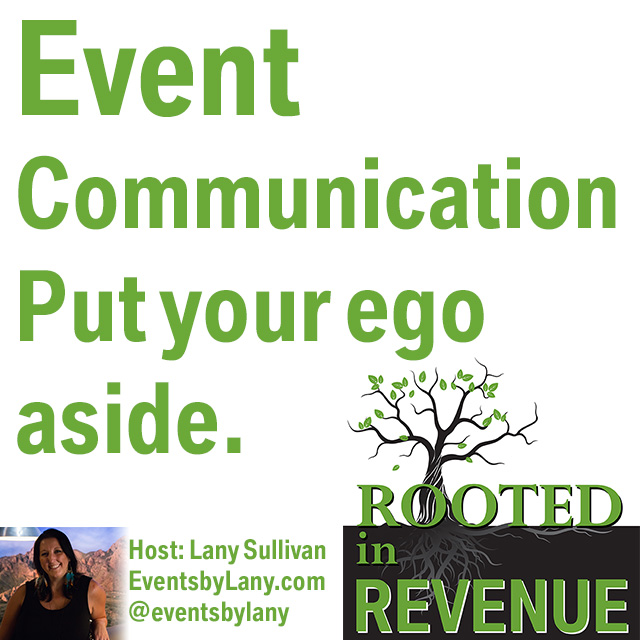
Thursday Apr 26, 2018
Event Communication - Put your ego aside
Thursday Apr 26, 2018
Thursday Apr 26, 2018
Communication can sometimes be the hardest part of an event. The details are manageable, but sometimes the people involved are not. You will deal with a wealth of personalities, opinions and experiences that you may not enjoy engaging with. Put your ego aside and listen first. Digest what is being said to you and then make sure that you clearly and concisely craft a response that does not incite drama.
Communication can be a challenge no matter what you are doing in life or business, but let's focus on the event application of it.
Why is communication important for an event creator, planner, founder or host?
It leaves no room for questions
It eliminate worry and concerns
It creates an open dialogue
It creates clarity
Communication these days comes in many forms; email, calls, text messages, Facebook messages, Google Hangouts, Skype, Twitter Direct Messages and even public posts on social. It's a wonder we can even keep our communication clear these days. As an event planner, I work hard to keep my communication with my clients down to just a couple of vices when it comes to communicating about an event. Typically, email is the first form of communication, then calls, text messages and somehow Facebook messages get thrown into the mix (even though I still hate Facebook). The more complex an event, the simpler your form of communication should be. There are so many elements to manage and execute on during an event, you want to make sure that your communication is clear for all parties involved.
Clear communication really helps to eliminate the stress, burden and annoyance of someone saying "I didn't know". Trust me on that one. Usually I am running more than one event at a time, so I am dealing with different personalities, opinions, expectations, etc, etc and I have to be able to navigate them without getting myself into trouble. We're all human, but sometimes we forget and take our frustration out on the person delivering the message not thinking about the ramifications of our form of communication, tone or words.
Let's talk about events that I have run in the past. When confirming event details with speakers, I prefer a very clear and detailed form of email that lays out all their needs, deadlines, expectations, reservations, etc. Sometimes these emails can be long, but I make sure that they are extremely clear. I even have it proof read by someone not on my team (who would know all of the details) to make sure that it makes sense to them (as someone not in the know). I make adjustments on clarity where necessary and then shoot the email out to the speakers.
Would it shock you to know that more often than not 20-30% of the responses ask questions regarding items that I clearly laid out in my email?
Probably not. It doesn't surprise me either.
We move through our days too quickly. We skim emails. We scan for what we recognize and then we shoot from the hip. We're all guilty of it. I've done it myself. Now, what if we as event planners, event creators, speakers, vendors and all other active participants slowed down for a hot minute and read through the email before jumping all over the messenger? That would be quite a novel idea.
Let's flip the script a bit. I was invited to speak at an online conference. I spoke with the host about the details and said I was definitely interested. That was the last I heard about it until about 15 days before the conference when I reached back out again to the host. I was getting ready to finalize my content and I wanted to make sure that my presentation and delivery was what they were looking for. After about 45 minutes on the phone and 20 questions from me to the host, I felt I had a good understanding of what they wanted. A week later I received a message from the host asking me when I could record. I was confused because nowhere in our previous conversations had they mentioned me recording my presentation with them. At this point I was already pre-recording my content and informed them so. They agreed to let me move forward with the pre-recorded presentation. My team finished compiling the presentation and I delivered it via email to the host. Wouldn't you know, I received an email in response that informed me that I did not use the event branded template.
Hhhmmmm.......
Again, nowhere in our conversations did a branded template ever come up. Might I remind you as well, that up until that point I had still not received any details about the event, expectations, deliverables, timing, etc. NOTHING. I even had to ask for an affiliate link after the host complained that no speakers had been promoting the event. I informed the host that I would be happy to promote it, but I never received an affiliate link as verbally promised.
I promoted the heck out the event, but I never saw the host promote the event until 4-5 days prior to it going live. Now, the day before the event I received an email geared toward participants informing them about all the good stuff happening during the live conference. It said that the speakers would be showing up live during their sessions. Guess who never received an email from the host letting her know when her session was going to be live so that she could show up and serve the audience properly. You guessed it... This girl.
Needless to say, the communication on that event is a prime example of what not to do as a host/event creator. Please take care of your speakers and communicate with them actively and often. They want to show up and do their best for you and your tribe.
I was recently chatting with another event planner and we were swapping stories as we all do about specific scenarios that we run into with clients. She shared with me that she resigned from a client because one of the major issues was communication. The client doesn’t like to repeat herself and gets upset when she has too. Understandable. Here’s the glitch. The client doesn’t give clear instructions in the first place. She’s all over the board and so when her team returns to her to get said clarification she loses it.
Events are hard enough as it is, so the client who doesn’t communicate wants, needs and desires clearly throws a monkey wrench into the whole thing.
Here’s the thing, to create something amazing and to keep the entire team, vendors and venue on task and on the same page this communication thing has to be worked out.
If someone from your team comes to you and doesn’t understand your instructions or the vendor is not clear or g-d forbid the venue is not clear; DO NOT BITE THEIR HEAD OFF. Pause. Breathe. Take responsibility. Ask them what they did not understand. Repeat what they said to you, so they know that you heard them (and didn’t lose your shit). State your instructions as clearly as you can and then ask if they understand or have any questions that you can clarify.
This is common sense, but we are not taking the time to communicate.